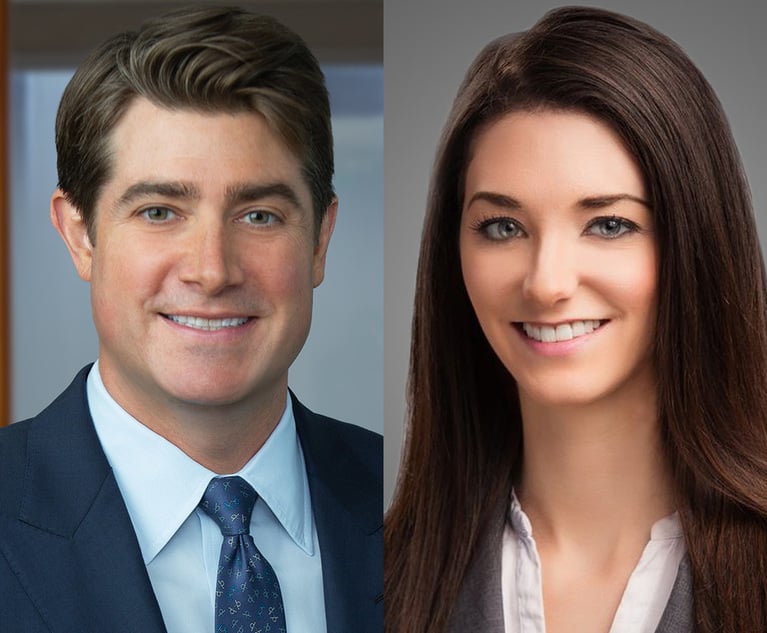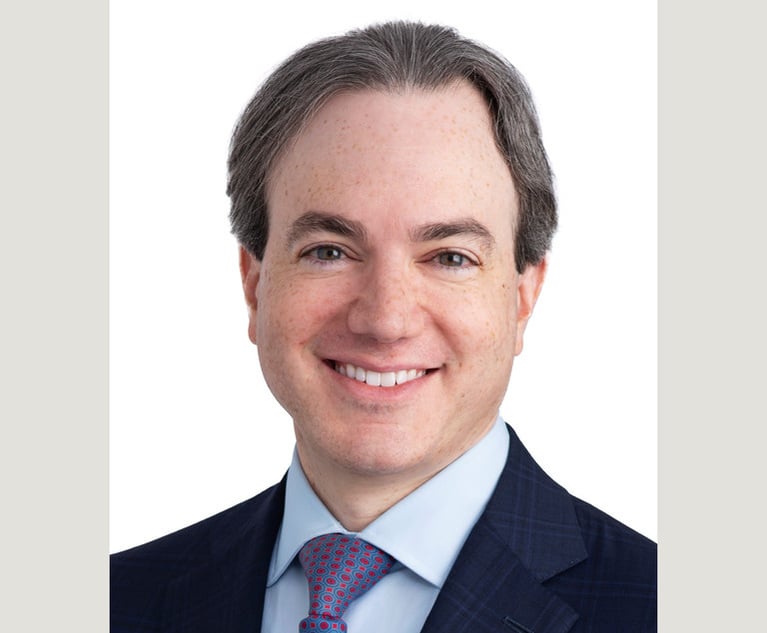Watch Out, Texas Criminal Defense Lawyers. It Just Got A Lot Easier To Get Sued
Before Friday, criminal-defense lawyers had little reason to fear legal-malpractice claims. This has changed.
February 21, 2020 at 03:09 PM
5 minute read
 Photo: Shutterstock.com
Photo: Shutterstock.com
Before Friday, criminal-defense lawyers had little reason to fear legal-malpractice claims.
That's because court precedent allowed clients who had been exonerated to sue criminal-defense lawyers and set a clear statute of limitations for these claims.
This has changed—thanks to a lawyer-turned-defendant.
Through some wrangling of the term, "exonerated," and an expansion of a legal-malpractice tolling rule in the criminal context, a divided Texas Supreme Court ruled 6-3 that attorney Patricia Skelton was not barred from suing her criminal-defense lawyer, Guy James Gray, for legal malpractice.
Skelton won habeas corpus relief to overturn her 2007 forgery conviction, because of ineffective assistance of counsel. However, during the litigation, she will have to prove that she did not commit the crime, the high court ruled.
Because it expanded a limitations tolling rule that applies in legal-malpractice cases, the majority also determined that Skelton was not too late when filing her claims.
In a dissent, three justices took issue with the majority's decision to expand limitations for Skelton, calling it a significant expansion of precedent, and warning that it will leave "criminal-defense lawyers under the shadow of potential malpractice claims" for years or decades.
"I would not toll limitations during post-conviction habeas corpus proceedings, which are potentially innumerable and interminable," wrote Justice Jimmy Blacklock, joined by Justices Paul Green and Jane Bland. "The simplest reason to be reluctant to expand Hughes tolling to habeas corpus proceedings is that the legislature has decided to give malpractice plaintiffs two years to bring their claims, not nine years as in this case, or even longer in future cases."
Skelton's attorney, Leslie Hyman, partner of Pulman, Cappuccio & Pullen in San Antonio, said she's disappointed Skelton's litigation against Gray has been delayed such a long time but glad that they can finally start litigating.
"We are glad the Supreme Court is giving us that opportunity," she said.
While acknowledging the criminal-defense bar has worries about the case, Hyman added that she doesn't think they should sweat it too much.
"It will be very difficult for most people to prove their innocence as an affirmative matter," she said, noting that she thinks she can do it for Skelton. "In most cases, I think it would be hard for somebody to prove that they didn't commit a crime."
What is 'Exonerated?'
In the course of deciding the case, the justices expanded two of their court's precedents.
The first, Peeler v. Hughes & Luce, said that only "exonerated" defendants could sue their counsel, since a convicted defendant's own criminal conduct is the proximate cause of their harm, rather than their attorneys' failures.
The majority ruled that a client can sue her criminal-defense attorney when the conviction was overturned either through direct appeal or through post conviction relief. Even though the majority agreed Skelton was not exonerated, it rejected the notion that a court needed to declare her "actually innocent" before she could sue Gray.
"If the conviction is vacated on other grounds, formerly convicted individuals may prove their innocence in their malpractice suit against their criminal-defense attorneys," said the opinion, written by Justice John Devine and joined by Chief Justice Nathan Hecht and Justices Eva Guzman, Debra Lehrmann, Jeff Boyd and Brett Busby.
They'll have to prove it by a preponderance of the evidence, the majority added.
Timely?
Another major question in the appeal centered around the statute of limitations for Skelton to sue Gray.
High court precedent in Hughes v. Mahaney & Higgins said limitations would be tolled until all appeals in the underlying claims are exhausted.
While Gray's position was that limitations should have started when Skelton in 2011 lost her direct appeal, Skelton countered that limitations should have started running when prosecutors dismissed her charges in the wake of her habeas proceeding overturning her conviction.
The majority sided with Skelton here.
"For purposes of the Peeler doctrine, the limitations period should be tolled during both direct appeals and post-conviction proceedings; conversely, limitations should run during periods when neither a direct appeal nor a post-conviction proceeding is pending," said the opinion. "While novel, this extension of tolling principles satisfies our preference for bright lines in the statute-of-limitations context and cures the potential problem of malpractice claims being tolled until some indeterminate time."
The limitations will not be running when a habeas petition is pending, or during the time that prosecutors determine whether to retry a defendant, or drop the charges.
"The state controlled when and whether to dismiss the charges," said the opinion. "It would be unfair to run out limitations during any delay or indecision about further prosecution."
Finding that Skelton's lawsuit was timely under the new Hughes tolling rule, the high court remanded her case for a trial, where she will be tasked with proving her innocence in the malpractice action.
Related story:
Texas Criminal Defense Attorneys Could Face New Liability Under High Court Case
This content has been archived. It is available through our partners, LexisNexis® and Bloomberg Law.
To view this content, please continue to their sites.
Not a Lexis Subscriber?
Subscribe Now
Not a Bloomberg Law Subscriber?
Subscribe Now
NOT FOR REPRINT
© 2025 ALM Global, LLC, All Rights Reserved. Request academic re-use from www.copyright.com. All other uses, submit a request to [email protected]. For more information visit Asset & Logo Licensing.
You Might Like
View All
Haynes and Boone Expands in New York With 7-Lawyer Seward & Kissel Fund Finance, Securitization Team
3 minute read
'None of Us Like It': How Expedited Summer Associate Recruiting Affects Law Students and the Firms Hiring Them

Big Law Firms Sheppard Mullin, Morgan Lewis and Baker Botts Add Partners in Houston
5 minute read
Trending Stories
- 1NJ Jury Awards $4.5M After Woman Trips on Carpet
- 2Blake Lively Is Sued by Texas Crisis Specialist in Latest 'It Ends With Us' Lawsuit
- 3Pa. High Court to Decide Whether Flight in a High Crime Area Can Result in an Investigative Stop
- 4EB-5 Immigration Investor Program: a Win-Win Program, or Is It?
- 5People in the News—Feb. 6, 2025—Unruh Turner, Fox Rothschild
Who Got The Work
J. Brugh Lower of Gibbons has entered an appearance for industrial equipment supplier Devco Corporation in a pending trademark infringement lawsuit. The suit, accusing the defendant of selling knock-off Graco products, was filed Dec. 18 in New Jersey District Court by Rivkin Radler on behalf of Graco Inc. and Graco Minnesota. The case, assigned to U.S. District Judge Zahid N. Quraishi, is 3:24-cv-11294, Graco Inc. et al v. Devco Corporation.
Who Got The Work
Rebecca Maller-Stein and Kent A. Yalowitz of Arnold & Porter Kaye Scholer have entered their appearances for Hanaco Venture Capital and its executives, Lior Prosor and David Frankel, in a pending securities lawsuit. The action, filed on Dec. 24 in New York Southern District Court by Zell, Aron & Co. on behalf of Goldeneye Advisors, accuses the defendants of negligently and fraudulently managing the plaintiff's $1 million investment. The case, assigned to U.S. District Judge Vernon S. Broderick, is 1:24-cv-09918, Goldeneye Advisors, LLC v. Hanaco Venture Capital, Ltd. et al.
Who Got The Work
Attorneys from A&O Shearman has stepped in as defense counsel for Toronto-Dominion Bank and other defendants in a pending securities class action. The suit, filed Dec. 11 in New York Southern District Court by Bleichmar Fonti & Auld, accuses the defendants of concealing the bank's 'pervasive' deficiencies in regards to its compliance with the Bank Secrecy Act and the quality of its anti-money laundering controls. The case, assigned to U.S. District Judge Arun Subramanian, is 1:24-cv-09445, Gonzalez v. The Toronto-Dominion Bank et al.
Who Got The Work
Crown Castle International, a Pennsylvania company providing shared communications infrastructure, has turned to Luke D. Wolf of Gordon Rees Scully Mansukhani to fend off a pending breach-of-contract lawsuit. The court action, filed Nov. 25 in Michigan Eastern District Court by Hooper Hathaway PC on behalf of The Town Residences LLC, accuses Crown Castle of failing to transfer approximately $30,000 in utility payments from T-Mobile in breach of a roof-top lease and assignment agreement. The case, assigned to U.S. District Judge Susan K. Declercq, is 2:24-cv-13131, The Town Residences LLC v. T-Mobile US, Inc. et al.
Who Got The Work
Wilfred P. Coronato and Daniel M. Schwartz of McCarter & English have stepped in as defense counsel to Electrolux Home Products Inc. in a pending product liability lawsuit. The court action, filed Nov. 26 in New York Eastern District Court by Poulos Lopiccolo PC and Nagel Rice LLP on behalf of David Stern, alleges that the defendant's refrigerators’ drawers and shelving repeatedly break and fall apart within months after purchase. The case, assigned to U.S. District Judge Joan M. Azrack, is 2:24-cv-08204, Stern v. Electrolux Home Products, Inc.
Featured Firms
Law Offices of Gary Martin Hays & Associates, P.C.
(470) 294-1674
Law Offices of Mark E. Salomone
(857) 444-6468
Smith & Hassler
(713) 739-1250






